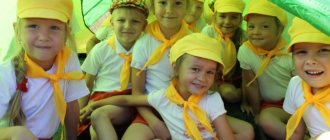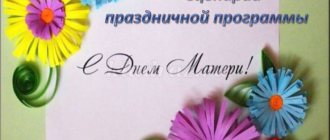Joint event between parents and children in primary school
Educational event for primary schoolchildren “Family Gatherings”.
Script Author: Elena Valerievna Gorelova, additional education teacher at the Municipal Educational Establishment of Children's Educational and Educational Center of the city of Komsomolsk-on-Amur. Description of material : this event can be held in any elementary school class. It is designed to introduce families of students of the same class, learn family traditions, customs and talents. At the end of the event you can have a tea party. Goals : to help develop the moral ideas of students and their parents about family relationships, to unite children and parents;
reveal the talents, hobbies and traditions of each family. Progress of the event :
Any calm song is played and a presentation is shown with photos of the family, children, parents, etc. on the slides.
Presenter: dear children, dear parents, grandparents! We are glad to see you at our “Family Gatherings”. The presenter calls the pre-prepared mom and dad, who read the skit “When did the word family appear?: When did the word family appear? Once upon a time the Earth had not heard of him - But Adam told Eve before the wedding; – Now I will ask you seven questions: Who will give birth to children for me, my goddess? Eve quietly answered: “I” - Who will raise them, my queen? Eve humbly answered: “I” - Who will cook, oh my joy? Eva still answered: “I” - Who will sew a dress, wash my clothes, caress me, decorate my home? “I, I,” Eve said quietly: “I, I,” She said the famous seven “I”s. That’s how a family appeared on Earth. Presenter: The most precious thing a person has is his family. What is family? This word is clear to everyone, like the words “bread” and “water”. Family is a home, it is mom and dad, grandparents, it is love and care, work and joy, misfortunes and sorrows, habits and traditions. When people truly value, respect and love each other, their family has an interesting life together. They enjoy giving pleasure to their loved ones, giving them gifts, organizing holidays for them. I'll tell you one legend. In ancient times, there lived one family, and love and harmony reigned in it. Rumor about this reached the ruler of those places, and he asked the head of the family: “How do you manage to live without ever quarreling or offending each other?” The elder took the paper and wrote something on it. The ruler looked and was surprised: the same word was written a hundred times on the sheet - (ask a question) “UNDERSTANDING.” – And indeed, love and peace reign in families when there is mutual understanding. There are 26 children in our class (13 girls and 13 boys), and these are 26 families. Each family is unique, it has its own traditions and talents. And we can’t wait to hear about you, our dear families. Tell us about your family, what you like to do as a family, what talents, traditions, rituals your family has. Show family photos. But... Music sounds, Kolobok appears on the slide and on the stage. Presenter: Hello Kolobok. We welcome you to our family gatherings. Maybe you’ll choose a family for yourself since you didn’t like living with your grandparents? Meet me. Various families come out to meet him, talk about their talents, and the host invites the kolobok to live with these families, but he refuses. After every family presentation, Kolobok is asked “Come live with us,” but he refuses every time. During breaks between performances. Contest. Two teams: parents and children. Teams are given proverbs about family, divided into two parts. It is necessary to connect them. • There is no need for treasure when there is harmony in the family. • When the family is together and the heart is in the right place. • What is it like at home? • Being a guest is good, but being at home is better. • The hut is not red in its corners, it is red in its pies. • In your own family the porridge is thicker. Scene. 1. Hello, my dear! Won't you go out for a walk? 2. What are you saying, I haven’t done my homework yet... 1. What lessons? Have you relapsed into childhood? It’s been a hundred years since you graduated from school! 2. Yes? What about the grandchildren? Nowadays it is very fashionable to do homework for your grandchildren. 1. Yes, I have been doing homework for my grandchildren all my life. 2. Really? Is this how you spoil them? 1. I don't spoil! I am very strict with them. Once I do my homework, they always copy it out for me. 2. Oh, really strict. 1. So if you need anything, ask me, I have a lot of experience. Every family comes up with a recipe for a happy family. Then the “snowball” technique - families name the “ingredients” of a happy family in order, but do not repeat themselves, and these “ingredients” are written on the slide. Host: Well, why did you choose a family to your liking? Kolobok: no, I understood that being away is good, but being at home is better. I'll run to my beloved grandparents! I will obey them, help them, have pity on them. I realized that I couldn't handle anything alone. You have very good, friendly families, you love each other. And my family worries about me and misses me. Thank you for talking some sense into me. Take care of your families, love each other! Presenter: wait a little while, stay with us a little longer. This is where our talented part of family gatherings ends and the deliciously talented part begins, which will be presented to us... Tea drinking. Music is playing. Presenter: says goodbye to Kolobok and to the families: this is where our family gatherings end. Thanks everyone. Take care of yourself and your loved ones, cherish every moment spent with them. Until next time. Photos from our family gatherings.
We recommend watching:
Project at school. Pedagogical support for parents for active participation in the educational process Scenario for a seminar for parents “The Rights of the Child” Cooperation between school and parents Research work in primary school
Similar articles:
Working with parents in elementary school. From work experience
Business games in working with parents
Organization of work with families in primary schools in accordance with the professional standard of a teacher


